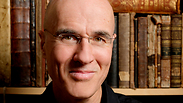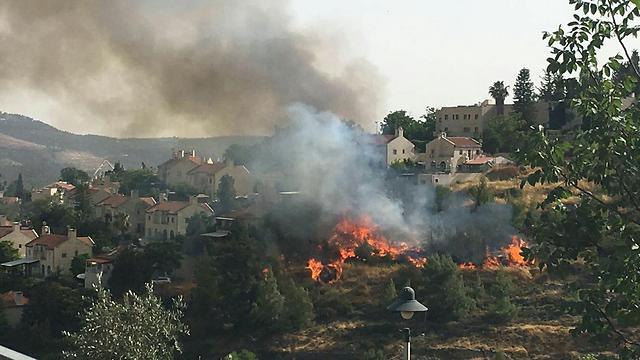
No doubt?
Op-ed: We all want to feel as secure as possible, but when it comes to the reality we live in, we can only know peace if we learn to embrace our fear of the unknown.
Security is a central goal in all our lives. We want to feel secure in the knowledge that no tragedy will befall us, that we won't be betrayed, that we will suffer absolutely no pain, that a beloved family member will return safely to us. That no one is trying to screw us over, that it's clean enough here, that we remembered to turn on the alarm before leaving the house, that our plane won't crash. That we won't be taken for a ride, that we won't get a ticket, that the Iranians won't reach the nuclear threshold and for God's sake, that our daughter won't be murdered in her own bed. We want to feel as secure as possible. One hundred percent secure. Without a doubt.
The problem with this is that you can't be completely secure, and in fact quite the opposite: You cannot rid yourself of that doubt. At the end of the day, mental health is based on the ability to live with that doubt. Because in actuality, our lives are always, always in grave danger. Only death is absolute, everything else is indefinite.
In my opinion, one of the biggest problems in Israel and the Western world at large is that the illusion of security, once held only be children, has in recent years begun to characterize all of society. Many of us truly believe that if we only act "correctly," we'll be safe from harm. And there are politicians and religious leaders who milk this belief for all it's worth.
The illusion of security is the belief that "If we only choose a strong leader to protect us," "If we only take severe precautions and respond with a strong hand," "If we only pray to a saintly righteous person to keep us safe" then everything would be alright, and nothing bad would happen to us. This is, of course, not true, and there was once a time when people knew this.
I like telling the story about the evaluation that Haganah Head of Operations Yigal Yadin gave before the provisional government of Israel that had been set up in preparation for the soon-to-be Israeli government. The meeting was convened on May 12, 1948, on the eve of the British Mandate. The issue at hand was a US proposal to delay Israel's declaration of independence from the upcoming Friday to three months later, thus staving off an invasion by the Arab armies poised on Israel's borders.
The threat was clear, and things were not looking good for Israel. Gush Etzion was about to fall. Jerusalem was under siege. The council members asked Yadin what chance Israel had to win the war. He answered that if the Arab armies balk at invading, the Jewish settlement would eventually overcome its difficulties and momentary defeats. If they were to invade, though, Israel's chances would be around fifty percent. And so the country was founded on a fifty-fifty chance of survival.
With such a courageous start, how is it that we eventually became addicted to the illusion of safety? My personal belief is that it within our nature to get used to a good situation and begin to take it for granted. Here's a painful example of that: Up until 150 years ago, only one out of every two children would survive to adulthood. In other words, until then almost all parents were bereaved. Today the death of a child is seen as an unforeseeable and inconceivable tragedy. Events that were once commonplace have become rare accidents, which is a good thing.
But accidents do happen as a part of life: Three weeks ago, our house burned down. We live in the Jerusalem suburb of Mevaseret, and on a particularly balmy day, the brush growing just outside our community caught fire, quickly climbing out the hill and finding its way to our house. The Fire Department was alerted, but they got stuck in a traffic jam on Route 1. All family members and pets were unharmed, but our house and garden now look like a modern, black-and-white painting.
I am writing this down in the rented apartment that we now occupy, hoping that the insurance company's down payment will promptly be transferred to our account, if possible before my cheerful branch manager Bella asks to have to have a talk with us.
Let's be honest: in all matters big and small, we don't have any security, nor will we ever. Having a sense of security is essential during the first few years of life, and plays a role in a happy and healthy childhood. It is our job as parents to wrap our children in it. When those children grow up, though, it is their insecurity that we must help them face, embrace and carry on with.
This isn't to say that needles risks should be taken, or that threats should be disregarded. Some things are 100% under our control: No child under nine should ever cross the street alone. Period. There is no doubt about this. But most things in life are not under our complete control, and we must live with the menacing uncertainties that linger around them even after we have taken all possible precautions.
What is probability? How does one live with it? What needs to happen to a boy, a teenager, or a soldier, for him to be able to peacefully live with the constant fear accompanying himself and his loved ones, without needing the dubious promises of politicians and rabbis?
There are, of course, other more responsible rabbis and politicians, as well. Unfortunately, at present they are all preoccupied with "Security Now," leaving us willing to accept illusion as the real thing, which is a shame. At the end of the day, true security isn't factual, since security is a mental state. It needs to be searched for within the heart, and not by avoiding plane flights, visiting Jerusalem or Sarona Market.
The road to security runs through relationships. That's the key to a happy childhood, it is where babies and small children receive the sense of security that allows them to fall asleep at night, alone in their beds, happy, content and without a care in the world.
I look at my daughter sleeping in her replacement bed, not thinking about what would have happened if we wouldn't have made it out on time of our burning house. Horrible things could still happen to her in life, but she is yet unaware of how unsafe she is.
It is for this reason that I am going to gently and gradually try to teach her to live with her doubts.
Prof. Yoram Yovell is a psychoanalyst, psychiatrist, brain researcher, and head of the Center of Interdisciplinary Research on Emotions.












